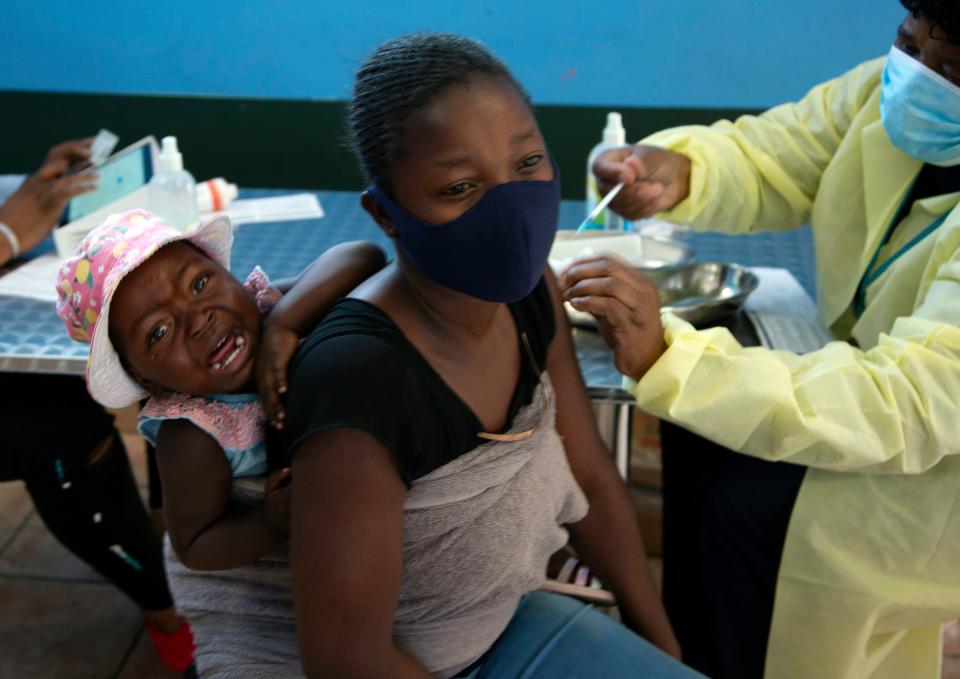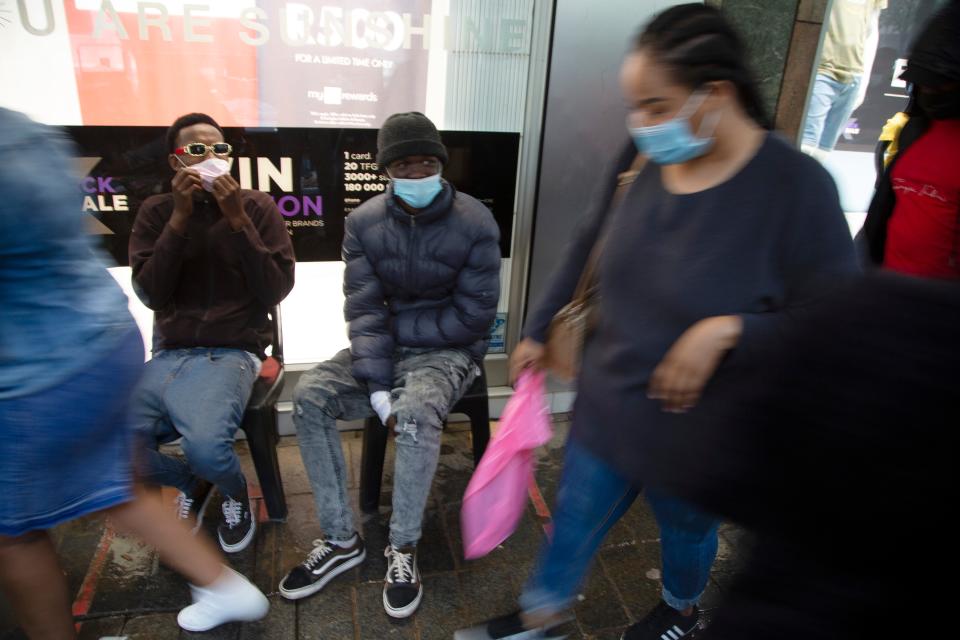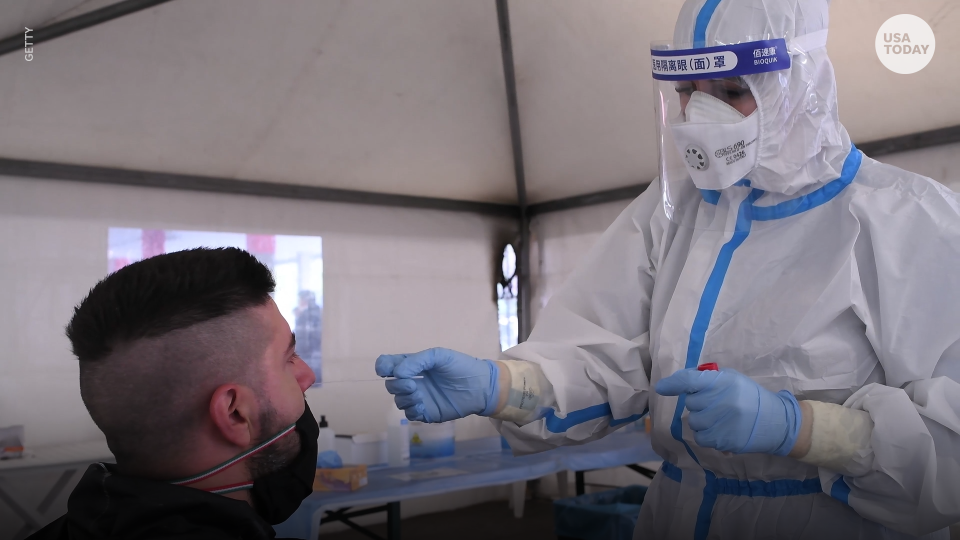Omicron variant: What to know about new COVID variant
- Oops!Something went wrong.Please try again later.
- Oops!Something went wrong.Please try again later.
Fears over the omicron variant of the coronavirus have spread across the globe within days of its discovery, sending stocks tumbling, prompting travel restrictions and drawing international attention to an uptick in cases in South Africa.
South African scientists identified the new version of the coronavirus last week that they say is behind a recent spike in COVID-19 infections in Gauteng, the country's most populous province. It's unclear where the new variant first emerged, but scientists in South Africa first alerted the World Health Organization and it has now been seen in travelers to Belgium, Botswana, Hong Kong and Israel.
From just over 200 new confirmed cases per day in recent weeks, South Africa saw the number of new daily cases rocket to 2,465 on Thursday. Struggling to explain the sudden rise in cases, scientists studied virus samples from the outbreak and discovered the new variant.
In a statement on Friday, the WHO designated it as a "variant of concern," naming it "omicron" after a letter in the Greek alphabet.
Early data is troubling, but incomplete, experts say.
The outbreak of the omicron variant in South Africa was like a "vertical line," according to Dr. Eric Topol, vice president for research at Scripps Research in La Jolla, California.
"We haven't seen anything like that," he said. "The line of slope is much higher than the initial delta line."
The omicron mutation "strongly suggests" it is easily transmitted and might elude immunity protections gained by previous infections and even vaccination, Dr. Anthony Fauci, President Joe Biden's chief medical adviser, warned Sunday.
"It's not necessarily that that's going to happen, but it's a strong indication that we really need to be prepared for that," Fauci said on "Meet the Press," adding that omicron " just kind of exploded" in South Africa.
Here's what's known and not know about this latest variant:
Why are scientists worried about this new variant?

It appears to have a high number of mutations — about 30 — in the coronavirus' spike protein, which could affect how easily it spreads to people.
Sharon Peacock, who has led genetic sequencing of COVID-19 in Britain at the University of Cambridge, said the data so far suggest the new variant has mutations "consistent with enhanced transmissibility," but said that "the significance of many of the mutations is still not known."
Lawrence Young, a virologist at the University of Warwick, described omicron as "the most heavily mutated version of the virus we have seen," including potentially worrying changes never before seen all in the same virus.
Waiting for answers to key questions
Scientists say there is still much to learn about the omicron variant, including key questions that remain unanswered.
Ashish K. Jha, dean of Brown University's school of public health, noted three metrics for evaluating the potential effect of a variant in a Twitter thread: if the new variant is more transmissible than the current predominant variant, if the variant causes more severe disease and if it will render prior infections or vaccines less effective.
All these questions remain largely unanswered, though Jha said it is "super unlikely" that the variant will render vaccines useless.
Experts say it may take weeks to know if current vaccines are less effective against omicron. Epidemiologist Céline Gounder estimated it may take about two weeks to make this determination.
Gounder said in a Twitter thread that scientists don't yet know how omicron may compare to delta in terms of how infectious it is and its incubation period.
Experts say new variant could be in US undetected

There are likely already undiscovered cases in the U.S., Topol said, a concern echoed by Fauci in a Saturday NBC interview.
"We have not detected it yet, but when you have a virus that is showing this degree of transmissibility and you're having travel-related cases they've noted in other places already, when you have a virus like this, it almost invariably is going to go all over," Fauci said.
New York declares state of emergency
Gov. Kathy Hochul declared a state of emergency in New York late Friday amid a surge in COVID-19 cases and the looming threat of the new Omicron variant.
The move by Hochul comes as hospitals are again warning of being overrun with COVID patients and as the state's positivity hit 3.8% on Thursday, the highest since mid-April. In some regions, the rates were even higher: nearly 10% in western New York and almost 9% in the Finger Lakes.
Hochul said the omicron variant has yet to be found in New York, but warned it is likely to arrive.
By declaring a state of emergency, the state Department of Health will be allowed to limit non-essential, non-urgent procedures for hospitals or systems "with limited capacity to protect access to critical health care services."
The state said that limited capacity will be "defined as below 10% staffed bed capacity, or as determined by the Department of Health based on regional and health care utilization factors."
The new protocols will begin Friday and will be re-assessed on Jan. 15. The measure will also allow the state to acquire more quickly any supplies to combat the pandemic, Hochul said.
The Democratic governor has yet to implement any new widespread COVID safety protocols, such as requiring masks indoors in all public spaces, as some counties are considering.
Erie County last week reestablished an indoor mask requirement as cases continue to grow in upstate New York's largest county.
Omicron's impact on vaccines unclear
Health experts have said it will likely be weeks before the world has good data about how omicron may reduce the effectiveness of current vaccines, but Moderna has already announced a three-point strategy to combat the new variant.
Moderna says its strategy for responding to omicron involves three options for boosting COVID-19 vaccination, should the variant prove problematic for current vaccines.
The three options, according to a Friday release from the company: A higher dose booster, shots currently being studied that are designed to "anticipate mutations such as those that have emerged in the omicron variant" and an omicron-specific booster — which is already in the works.
Multiple media organizations on Friday reported Pfizer-BioNTech is studying the new variant and expects data within weeks. If warranted, a targeted vaccine could be developed within 6 weeks and ship within 100 days, the reports say.
Johnson & Johnson is also testing its current vaccine against omicron, according to CNBC.
Professor Andrew Pollard, director of the Oxford Vaccine Group, told BBC Radio he was cautiously optimistic existing COVID vaccines would be effective in preventing serious illness from the omicron variant, adding that mutations in omicron appear to be in similar regions as the mutations in other variants.
How did this new variant arise?

The coronavirus mutates as it spreads and many new variants, including those with worrying genetic changes, often just die out. Scientists monitor COVID-19 sequences for mutations that could make the disease more transmissible or deadly, but they cannot determine that simply by looking at the virus.
With identification of omicron, are more travel restrictions ahead?
Just when things were looking up for airlines and the rest of the travel industry, another COVID-19 variant has emerged. Early reports of the omicron variant instantly sparked restrictions on travel.
The United States, which lifted a pandemic-long travel ban from dozens of international countries including South Africa on Nov. 8, on Monday will reinstitute the ban for foreign nationals from eight African countries.
The CDC issued a level 4 advisory, its highest, due to "very high'' COVID-19 levels, a level that carries an "avoid travel'' designation. The State Department, whose COVID-19 advisories generally parallel the CDC's, also raised the countries to level 4, which means "do not travel."
Contributing: USA Today, USA Today New York State Team, AP Medical Writer Maria Cheng and The Associated Press
This article originally appeared on Rochester Democrat and Chronicle: Omicron variant: What to know about new COVID variant

